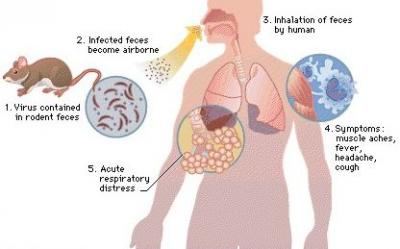Hantavirus Pulmonary Syndrome (HPS) Causes, Symptoms, Diagnosis and Treatment

What is Hantavirus Pulmonary Syndrome?
Hantavirus pulmonary syndrome is an infectious disease characterized by flu-like symptoms that can progress rapidly to potentially life-threatening breathing problems.
It is one of two potentially fatal syndromes of zoonotic origin caused by species of Hantavirus.
These include:
- Black Creek Canal virus (BCCV)
- New York virus (NYV)
- Sin Nombre virus (SNV)
- certain other members ofHantavirus genera that are native to the United States and Canada
It is also defined as a lung infection caused by viruses found in the saliva, urine, and droppings of some rodents.
Causes of Hantavirus Pulmonary Syndrome:
Each type of Hantavirus has a preferred rodent carrier.
It can be transmitted in two ways
- Inhalation, the main route of transmission.
- “Aerosolization” of viruses shed in infected rodents’ droppings, urine or saliva.
- Person to person transmission
All in all, people can get infected by:
- Breathing in tiny airborne particles that come from rodent urine.
- Touching rodent urine, saliva, or droppings.
- Coming in contact with dust contaminated with the virus.
- Being bitten by an infected mouse
Factors and activities that increase the risk of developing HPS include:
- Opening and cleaning long unused buildings or sheds
- Housecleaning, particularly in attics or other low-traffic areas
- Having a home or work space infested with rodents
- Having a job that involves exposure to rodents, such as construction, utility work and pest control
- Camping, hiking or hunting
Symptoms of Hantavirus Pulmonary Syndrome:
The following symptoms are exhibited:
- Fever and chills
- Headaches and muscle aches
- Vomiting, diarrhea or abdominal pain
- A cough that produces secretions
- Shortness of breath
- Fluid accumulating within the lungs
- Low blood pressure
- Reduced heart efficiency
- Acute respiratory failure
- Lung infection
Diagnosis of Hantavirus Pulmonary Syndrome:
HPS is diagnosed via:
- A physical exam
- Query about symptoms, past health and exposure to rodents
- Imaging tests
- Chest x-rays
- Complete blood count
- Oxygen saturation test
Treatment of Hantavirus Pulmonary Syndrome:
There is no cure or vaccine for HPS. But the prognosis improves with early recognition, immediate hospitalization and adequate support for breathing.
- Supportive therapy
- Assisted respiration
- Intubation
- Blood oxygenation
- extracorporeal membrane oxygenation to help ensure one retains a sufficient supply of oxygen
By : Natural Health News




